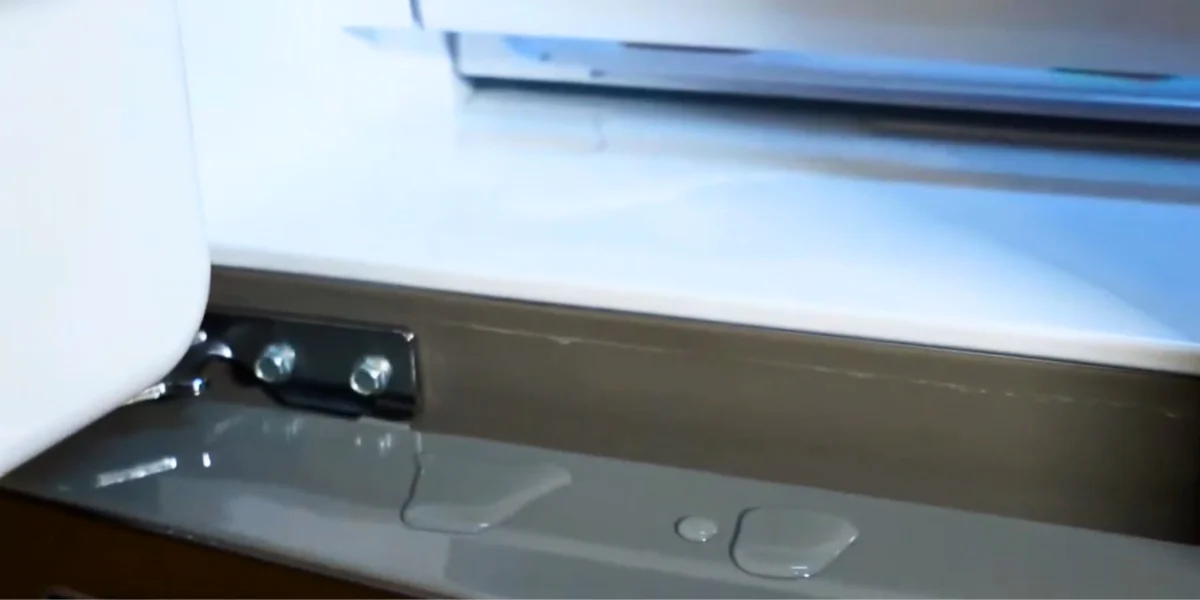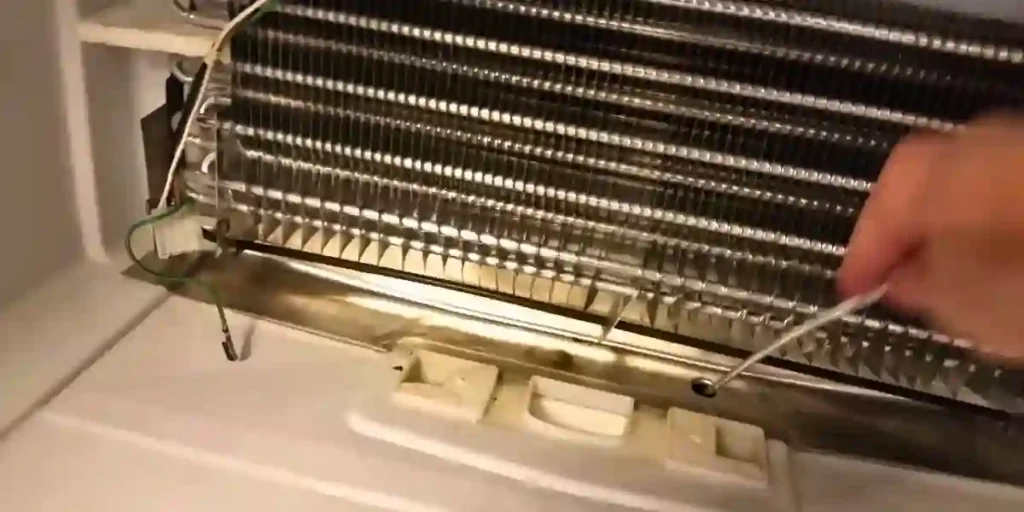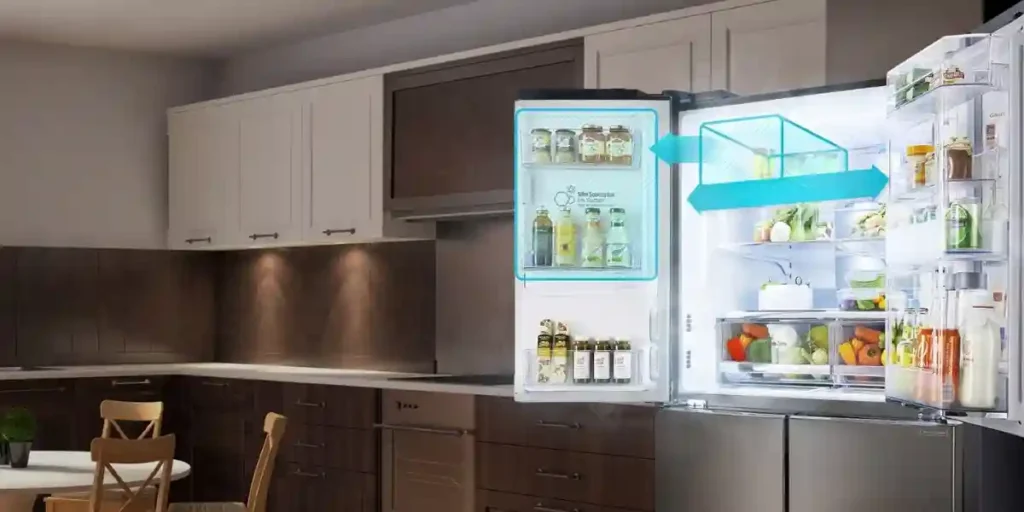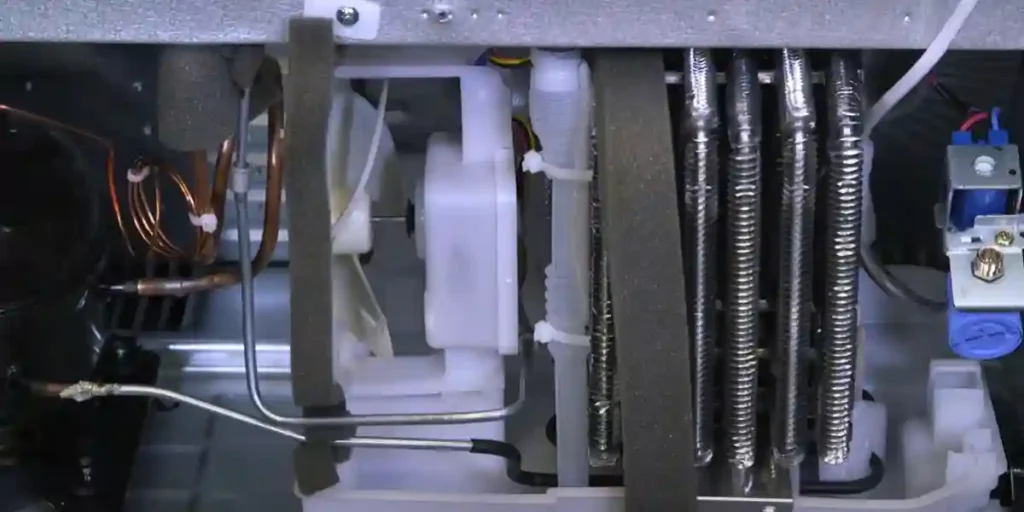LG French Door Refrigerator Leaking Water From Door: Quick Fixes
We may earn affiliate fees for purchases using our links (at no additional cost to you).
Is your LG French Door Refrigerator leaking water from door?
Discover the root cause of this pesky problem. In this article, we delve into the world of leaking refrigerators. It helps to identify common culprits to potential solutions. Bid farewell to soggy floors and welcome a hassle-free fridge experience.
Let’s dive in!

LG French Door Refrigerator leaking water from door
LG French door refrigerator can leak water due to several reasons. You need to identify the water sources to resolve the issues.
Let’s move on to the crucial step of identifying the source of the water leak.
Inspect the Water Supply Line
First, check the water supply line that connects to the refrigerator. Look for any visible cracks, tears, or loose connections.
Even a small pinhole leak in the water supply line can result in significant water leakage.
Examine the Door Seals and Gaskets
Carefully inspect the door seals and gaskets. Look for signs of wear, damage, or misalignment.
Close the refrigerator door. Then check for any gaps or irregularities in the seal’s alignment.
A faulty seal can allow warm air to enter the refrigerator. That leads to condensation and water leakage.
Clearing the Internal Drainage System

If the water leak persists, it’s essential to examine the internal drainage system.
Locate the drainage hole at the bottom of the refrigerator compartment. Make sure that it is not blocked by debris or ice buildup.
A clogged drainage system can cause water to accumulate and leak from the door area.
Check for Cracks in the Water Dispenser
Inspect the water dispenser and ice maker system crucially. Look for any cracks or damage.
Sometimes, a defective dispenser or ice maker can result in water leakage from the refrigerator door.
Resolving the LG French Door Refrigerator Water Leak
After identifying the source of the leak, it’s time to take appropriate steps. That resolves the issue and prevents further water leakage.
Replacing the Water Supply Line
If you find any damage to the water supply line, it’s crucial to replace it promptly. Purchase a compatible water supply line.
Buy it from an authorized LG retailer or service center. Follow the manufacturer’s instructions to disconnect the old line. Then install the new one securely.
Repairing or Replacing Door Seals and Gaskets
In the case of defective door seals and gaskets, consider contacting LG customer support. You can also contact an expert technician for assistance.
They can guide you on repairing the seals. Or recommend replacements if necessary.
Clearing the Internal Drainage System
To clear a clogged drainage system, carefully remove any debris or ice buildup. Use a small brush or a pipe cleaner to ensure the passage is completely unblocked.
Professional Assistance
If you are unable to identify the source of the leak, it’s best to seek professional assistance.
Contact LG’s customer support or schedule a visit with the technician. They can assess and fix the issue.
Mechanism of LG Refrigerator

To tackle water leakage from LG French Door Refrigerator, it’s essential to understand the appliance’s working mechanisms.
Let’s explore some crucial aspects of the refrigerator. It helps to gain a better grasp of the situation.
The Water Dispenser and Ice Maker System
One of the standout features of an LG French Door Refrigerator is its smart water dispenser and ice maker system.
This system allows you to conveniently access chilled water and ice cubes.
You can access it without opening the refrigerator doors. The water dispenser and ice maker are typically located on the exterior of the refrigerator door.
The Water Supply Line
To facilitate the water dispenser and ice maker, the refrigerator comes with a water supply line. That connects to your home’s water source.
This line runs through the refrigerator’s interior. It reaches the dispenser and ice maker on the door.
Any leakage in this water supply line can result in water escaping onto the floor.
The Door Seals and Gaskets
Another critical component of the refrigerator is the door seals and gaskets.
These rubberized seals create an airtight barrier between the refrigerator and the external environment.
Any damage or misalignment of these seals can lead to water seepage. That caused a leak near the door area.
Internal Drainage System
The LG French Door Refrigerator also features an internal drainage system.
That is responsible for channeling condensation and excess water away from the appliance.
A clogged or malfunctioning drainage system can cause water to accumulate.
It eventually creates a leak from the refrigerator’s door.
Tips to Prevent Water Leakage from LG French Door Refrigerator
Check the Door Seal
Ensure that the door seal is clean and free from any debris or food particles. Over time, dirt and grime can accumulate.
That causes the seal to lose its effectiveness. Wipe the seal regularly with a damp cloth. Inspect for any signs of damage.
If you notice any cracks or tears, consider replacing the seal to maintain a tight closure.
Verify Water Supply Line
Inspect the water supply line connected to the refrigerator’s dispenser and ice maker.
Look for any leaks, kinks, or loose connections. If you find any issues, promptly fix or replace the damaged parts.
It will prevent water from seeping into unwanted areas.
Adjust the Leveling Feet
Ensure that your refrigerator is level. It prevents water from pooling at the bottom of the appliance. Use a bubble level to check the balance.
Then adjust the leveling feet as needed. This simple step can help avoid water leakage. It keeps your fridge running smoothly.
Clean the Drain Tube

The drain tube at the back of your LG Refrigerator can get clogged with debris or ice. That leads to water leakage.
Regularly inspect and clean the drain tube to keep it clear and functional. Use a mixture of warm water and mild detergent to flush out any obstructions.
Defrost Regularly
Frost buildup in the freezer can cause water to leak from your refrigerator. Follow the manufacturer’s instructions on defrosting your fridge regularly.
Keeping the freezer frost-free will minimize the chances of water leakage.
Inspect the Defrost Drain Pan
Defrost drain pan is Located beneath the refrigerator. It collects water from the defrost cycle. Check the pan for cracks or damage.
That can lead to leakage. If you find any issues, replace the drain pan promptly. It helps to avoid any potential water-related mishaps.
Ensure Proper Air Circulation
Refrain from overloading your refrigerator. This can obstruct proper air circulation. Poor airflow can cause temperature fluctuations and excess condensation.
That leads to water leakage. Organize your items efficiently. It allows for optimal cooling and ventilation.
Regular Maintenance
Lastly, conduct regular maintenance checks on the Refrigerator. Keep it clean, and inspect for any signs of wear or damage.
Address issues promptly. Regular maintenance can prevent water leakage. It also extends the lifespan of your appliance.
Follow these comprehensive tips to keep your LG Refrigerator in top-notch condition.
FAQs
Can I use a temporary fix for a water supply line leak?
Is water leakage near the dispenser normal during the summer months?
Can a damaged water dispenser system cause ice maker issues too?
How frequently should I check and clean the internal drainage system?
Will LG’s warranty cover refrigerator repairs?
Conclusion
Dealing with an LG French Door Refrigerator leaking water from door requires a systematic approach. Identify the root cause and take appropriate action to get rid of this pesky issue.
Follow our guide to find the culprits easily and resolve the issue effectively. Remember to seek professional assistance if needed. That ensures the longevity and optimal performance of your refrigerator.